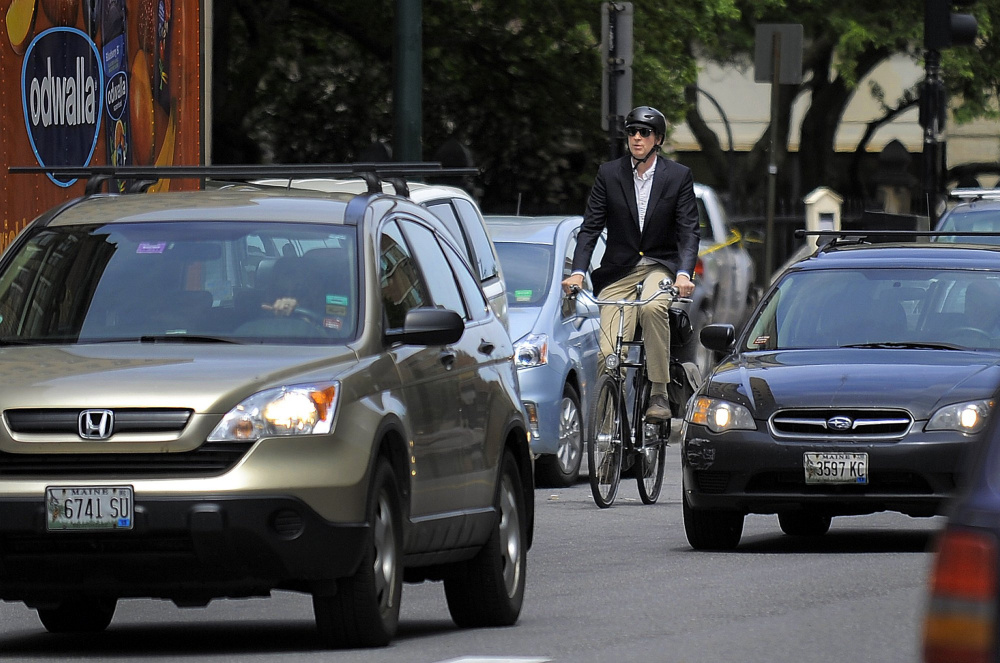A new bicycle-pedestrian law that goes into effect in Maine this month clarifies the responsibilities of cyclists in following the rules of the road. That raises a question I’ve often wondered about: How much effort do police spend enforcing such laws?
To learn the answer, I interviewed police chiefs and officers around Maine, and I gathered statistics from the Maine Violations Bureau. I also participated in a webinar and a meeting with law enforcement officials, both organized by the Bicycle Coalition of Maine.
Here is what I learned:
Very few motorists or cyclists receive tickets for violating bicycle laws.
In the 12 months that ended in June, two people were ticketed in Maine for violating the law that requires motorists to give at least 3 feet of clearance when passing bicyclists. During that same period, a dozen cyclists were ticketed for infractions such as having inadequate lights at night and failing to stay to the right of the roadway.
Enforcement is most likely to happen when a car or truck collides with a bicyclist. “We will generally charge a (motorist) if they committed a moving violation that led to a crash,” said Lt. Frank Clark of the South Portland police.
Other law enforcement officials said the same. Motorists could be charged with a variety of civil and criminal violations after such a crash, including distracted driving or driving while intoxicated.
Some police departments focus more on enforcement than others. The Sagadahoc County Sheriff’s Department stands out for taking proactive measures, such as encouraging cyclists to call in incidents when they have close calls with vehicles.
“We’ll try to follow up, locating the owner of the vehicle and having a conversation with them,” said Sheriff Joel Merry. He said that has happened five or six times in the past year.
Many cyclists want stepped-up enforcement, targeting both motorists and bicyclists. Readers have written to me about scofflaw bicyclists more than any other topic. Their comments go something like this:
I am a cyclist who obeys the law. Bicyclists who break the law by riding against traffic or breezing through intersections anger motorists and make them more likely to retaliate, thus putting me at risk. I want police to crack down on them.
During the first nine months of the year, Portland had 44 crashes involving motor vehicles and cyclists. When a collision occurs while a car is passing a bicyclist, that is prima facie evidence of a violation of the 3-foot law.
So, I wondered why there weren’t more tickets issued.
Cmdr. Gary Rogers of the Portland police explained that most collisions in urban areas take place at intersections, not when cars are passing cyclists. Moreover, he said, an officer is supposed to witness a violation to issue a citation.
Portland police ticketed a South Portland school bus driver in April for violating the 3-foot law after reviewing footage from the cyclist’s video camera.
Some cyclists routinely document their bicycle rides for that exact purpose – to have proof in case of a crash or other encounter with motorists.
In another Portland case last year, Jim Hettenbach was hit by a car from behind while commuting by bike, in a slow-speed collision. Hettenbach was knocked off his bicycle, and he had some blood clots in his leg. His bike had about $100 in damage. The police officer who responded filed an incident report but did not ticket the driver.
Hettenbach contacted the Bicycle Coalition of Maine. “The coalition was able to reach out and engage Portland police in a dialogue,” Hettenbach said. “A few days later, the driver was issued a citation for failure to keep a safe distance.”
Jim Tasse, the coalition’s assistant director, sees progress in ensuring that motorists obey bicycle laws.
“My sense is that police officers are increasingly following up on incidents and in some cases issuing citations,” he said. “And if nothing else, they seem much more willing to have the conversation about doing more to protect the rights of law-abiding bicyclists.”
During the next year, the coalition plans to train driver’s education instructors and Criminal Justice Academy cadets about bicycle law and enforcement priorities.
The coalition also hopes to expand membership in the Law Enforcement Collaborative, a year-old group of Maine police officers and bicycle advocates who work together on safety issues.
The new law that takes effect on Oct. 19 clarifies cyclists’ responsibilities and that will make it easier for police to ticket cyclists who disobey the law.
To date, very little enforcement has targeted cyclists. But some police say they will consider doing that in the future.
“I hate to see car-bike crashes,” said Clark of South Portland, who is a bicyclist. “The vulnerable user in those cases is most frequently the one who ends up in the physical therapist’s office, the hospital or worse. … We’re game for doing whatever we can, even having a simple discussion or (giving a) verbal warning, in hopes of reducing crashes and saving lives.”
Shoshana Hoose is a freelance writer who bicycles in Greater Portland and beyond. Contact her at shoshanahoose@gmail.com.
Copy the Story LinkSend questions/comments to the editors.



Success. Please wait for the page to reload. If the page does not reload within 5 seconds, please refresh the page.
Enter your email and password to access comments.
Hi, to comment on stories you must . This profile is in addition to your subscription and website login.
Already have a commenting profile? .
Invalid username/password.
Please check your email to confirm and complete your registration.
Only subscribers are eligible to post comments. Please subscribe or login first for digital access. Here’s why.
Use the form below to reset your password. When you've submitted your account email, we will send an email with a reset code.